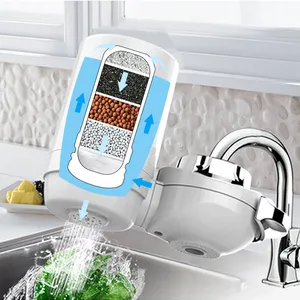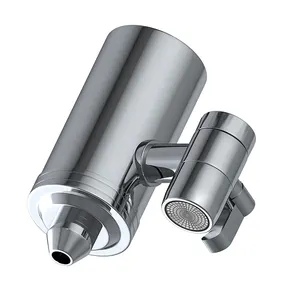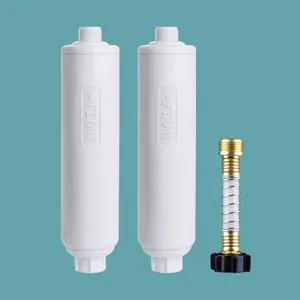Introduction
Water, the essence of life, is under constant threat from various pollutants, making its purification a necessity. This article delves into the world of carbon water filters, a popular and effective solution to water contamination. We explore the science behind these filters, the different types available, and their benefits. We also provide a comprehensive guide to choosing the right carbon water filter, considering factors like your water source, household consumption, filter lifespan, and budget. Lastly, we touch upon the installation and usage of these filters, ensuring you get the most out of your water purification system.
Understanding Water Contamination
Water pollution is a widespread issue that jeopardizes our health and the environment. It occurs when harmful substances, often chemicals or microorganisms, contaminate a body of water, degrading its quality and rendering it toxic. Water is uniquely vulnerable to pollution due to its ability to dissolve more substances than any other liquid on earth. Major sources of water pollution include agricultural runoff, sewage and wastewater, oil pollution, and radioactive substances. This contamination can have severe effects on human health and the environment, making the need for effective water filtration systems, like carbon water filters, crucial.
The Role of Carbon Water Filters
Carbon filtering is a purification method that uses activated carbon to remove impurities from fluids, including water, through a process called adsorption. The activated carbon, which is highly porous, traps pollutants within its pore structure. This makes it highly effective at removing chlorine, sediment, volatile organic compounds, taste, and odor from water. However, it's important to note that carbon filters are not effective at removing minerals, salts, and dissolved inorganic substances.
Types of Carbon Water Filters
Carbon filters, made from coal or other materials like coconut shell, work through a process called adsorption. The activated carbon is porous, trapping particles attracted to the material. These filters vary in size, design, function, efficiency, and life cycle. Different activated carbon filters are designed to allow a certain flow rate of water through the filtering process. The effectiveness of a carbon filter depends on what it's designed to filter out, and its adsorption capacity, which when exceeded, requires the filter to be changed.
Activated Carbon Filters
Activated carbon filters, often referred to as 'charcoal' filters, are made from organic materials like coconut shells or coal that are high in carbon. These materials are heated in the absence of oxygen to increase their surface area. The activated carbon in these filters removes certain chemicals dissolved in water by trapping them. However, it's crucial to know the type and concentration of contaminants, and average water use, to determine the correct size and components of the system. Over time, the GAC's ability to bind and remove chemicals diminishes, necessitating a change of the GAC.
Granular Activated Carbon Filters
Granular activated carbon filters, often referred to as 'charcoal' filters, are made from organic materials like coconut shells or coal. These materials are heated in the absence of oxygen to increase their surface area. The activated carbon in these filters traps and removes certain chemicals from water, making them an effective solution for water treatment. However, the effectiveness of these filters depends on the type and concentration of contaminants, as well as average water use. Over time, the GAC's ability to bind and remove chemicals diminishes, necessitating a change of the filter.
Benefits of Carbon Water Filters
Activated carbon filters are a prevalent type of water filtration system, especially in industrial settings. These filters are natural and offer numerous health benefits. They play a crucial role in ensuring the water we use daily, from drinking to cleaning, is clean and free from harmful substances. For commercial and industrial purposes, activated carbon filters are a reliable choice, providing clean water without any adverse effects.
Choosing the Right Carbon Water Filter
Choosing the right activated carbon filter involves several considerations. Firstly, opt for filters with coconut-based activated carbon due to its effective micro pores. Check the filter for cracks and excessive carbon dust, indicating quality. Understand the performance metrics of the filter, including its capacity and chlorine reduction percentage. Ask for the iodine value of the block, a higher value indicates better performance. Lastly, ensure the filter has quality certifications like NSF, ANSI, and WQA.
Consider Your Water Source
When considering your water source, it's crucial to understand the potential contaminants. Groundwater, often sourced from aquifers, can become polluted with pesticides, fertilizers, and waste from landfills and septic systems. Surface water, which fills our oceans, lakes, and rivers, is also at risk, with nearly half of our rivers and streams and over a third of our lakes polluted. Contaminants can range from nutrient pollution, including nitrates and phosphates, to industrial waste. Ocean water, too, is affected by contaminants from land-based sources. Understanding your water source can help you choose the right carbon water filter.
Evaluate Your Household Water Consumption
Understanding your household's water consumption is crucial when choosing a carbon water filter. According to the Environmental Protection Agency (EPA), the average American family uses more than 300 gallons of water per day at home. This usage varies across the United States, with factors such as population growth and environmental conditions playing a significant role. For instance, states experiencing high population growth like Utah and Idaho have an average water usage per person of 151-200 gallons per day. Therefore, when selecting a carbon water filter, consider your household's water consumption patterns.
Understand Filter Lifespan and Maintenance
Understanding the lifespan and maintenance of a carbon water filter is crucial. Typically, carbon filters should be replaced after 18-24 months of continuous usage. However, this can vary depending on the product and usage conditions. Factors influencing the lifespan include the type of carbon particles used, the filter's density, and the environment's humidity. For instance, pelletized carbon particles tend to last longer than granulated ones, and filters perform optimally in 60%-70% humidity. It's also important to monitor changes in water taste and odor, as these can indicate when a filter needs replacing.
Assess Your Budget
Choosing the right carbon water filter also involves considering your budget. A cost-effective solution is a high-performance whole-house water filter. The complete filter set can be affordable, providing a sediment filter, carbon block filter, o-rings, and lube. Remember, investing in a quality water filter can lead to long-term savings by protecting your health and reducing reliance on bottled water.
Installation and Usage of Carbon Water Filters
Installing or replacing an activated carbon filter is a crucial part of maintaining your water purification system. Always consult with a professional or your manufacturer to ensure you're using the right parts and installing them correctly. Activated carbon block filters typically need replacement every 6-12 months, depending on usage and water quality. Regular maintenance ensures your system runs trouble-free, providing safe and healthy drinking water. Always use quality, NSF certified replacement parts for optimal performance.
Conclusion
In conclusion, carbon water filters play a pivotal role in combating water pollution, providing us with clean and safe water. Understanding the types of filters, their functionality, and their benefits is key to making an informed choice. When selecting a filter, it's crucial to consider your water source, household consumption, filter lifespan, and budget. Regular maintenance and timely replacement of filters ensure optimal performance. By investing in a quality carbon water filter, you're not just investing in a product, but in your health, the environment, and a sustainable future.
















































 浙公网安备 33010002000092号
浙公网安备 33010002000092号 浙B2-20120091-4
浙B2-20120091-4